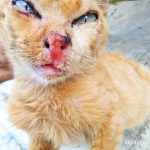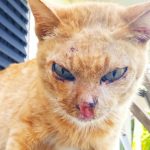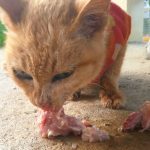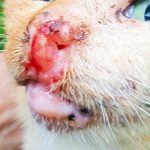Hello,
It sounds like your cat doesn’t have a diagnosis and we are chasing treatment options that don’t seem to be working. This tactic always gets me concerned because it makes it very hard to know what to do next or where to go for help. If you can afford it I recommend you see a feline practitioner. This is a veterinarian who only sees cats, or has a veterinary practice that only takes care of cats. I would also ask about trying a steroid, appetite stimulant, feeding tube and better help with at home care if you do not re hospitalize for iv fluids and in patient care.
I also strongly recommend that the constipation be confirmed with a recital exam by the vet before enemas are done at home.
This is a tough case and your cat needs to see the vet.
Colin to Dr. Krista : May I pick your Brains?
Dear Dr. Krista,
I’m writing to ask your advice about a stray cat I found last month. See images attached.
But first I want to thank you for the polyp videos you made, which were refreshing, as well as impressive.
One of my strays was snoring, so I was eager to pluck out a polyp hiding behind his soft-palate. (He didn’t have one, but I’m gratefully alerted for the future.)
Last month I found a stunted stray ginger cat outside a 7/11 in North Thailand, where I’m a self-financed Christian missionary.
Can you help me diagnose, and treat the problem?
At first I thought it was simply FVR / Calici and chronic snuffles.
But when I opened her mouth, she had only 4 teeth in her head!
Yes, she had calici tongue-ulcers, but little sneezing, no ocular discharge, and has been eating like a horse from day one. She’s happy and bright in herself, apart from the ugly sore nose.
Her mandibular Ln were big and hard, so I put her on antibiotic tablets, with a little dexamethasone (actually 2.5mg Prednisolone tab. daily.)
Then after a week or so I sedated her, and examined her mouth more closely, no observable polyps (drat!) but one of her molars was loose and covered in calculus, so I pulled that one out, and cleaned up the remaining molar and two premolars, otherwise the poor thing would have zero teeth.
There was of course gingivitis and pharyngitis, but pink, not red like “dragon-mouthed cats” on dcf.
For the last month I’ve given her a course of floxacilin (30 days) with amoxycillin, and tried all sort of creams on her nose and lower eyelids which. as you can see, are raw and sore.
Her Ln are almost normal now, +but that nose is no better+, and she tries to rub as though it is itchy.
(I made up creams mixing; 10% flours of sulphur, betamethasone, ivermectin, and vaseline)
There’s a temporary lessening at best, but no lasting improvement.
So what is your differential for her?
In NZ where I locummed, cat leprosy was common (Mycobacterium from mice and voles) so that was my diagnosis, but the floxacillin has made no impression.
I’ve trimmed her claws and taped her fore paws to stop her making her nose raw.
I’m stuck, and thought of asking you Doc.
I’d guess she’s 3-4 years old, confident, unvaccinated, entire, lived wild all her life eating left over fast food, and possibly DCF from neighbours.
Since October I’ve been feeding her raw chicken frames, tinned sardines, vitamin syrup, and no DCF.
She loves raw chicken :), and eats whatever I put in front of her and still looks for more.
Apart from her nose you would not think she was ill in any way.
Thanks for your advice.
Colin
PS. For some reason, Depo-medrone has been taken off the market here, not even local vets can get hold of it.
Colin Melbourne English missionary in Asia
https://www.born-again-christian.org/news/
https://www.born-again-christian.org/news/ไทยคริสเตียน/
https://www.born-again-christian.info/aboutus.htm
https://www.born-again-christian.com (Asian languages)
Comments
My 18 year old cat (long hair) has been having some issues for about 2 weeks now. On 2/10/24 he started throwing up at breakfast and didn’t want dinner, Stopped drinking and eating from that point and howl crying by sunday night into Monday. Got hospitalized on Monday the 12th got labs done, a urinalysis, semi ultrasound and xrays. He was severely dehydrated, negative for UTI, severely anemic (6.8 range was 10.9-15 ). Over night he got IV fluids and antibiotics and ate some the morning, labs were normal by discharge except for anemia. Xray ray did reveal, distended stomach with gas, arthritis, one small kidney. He came home didn’t really eat much, followed up with regular vet got subq fluids and appetite stimulant (rubs on ear), 1-2 days after he ate like a horse mostly broths and liquids foods. He is now constipated and vomiting again, not eating and lethargic. Took him to the vet 2/24/24 for subq fluids vet also gave him an enema. He has not pooped still its been about 30 hours. I tried to give him gabapentin yesterday but he threw up. This morning he threw up “poop” like vomit. We gave him 1/2 ish teaspoon of miralax this morning threw up a little while later more poop like vomit. Seems to have broken a bit of his k9 tooth off also, doesnt seem to bee botbering him… We are considering doing at home mineral oil enema with a baby enema glycerin suppository with more miralax. He has eaten a tiny bit of Broth treat today and gotten outside for 2 walks. Are we doing the right steps ? Is there more or less we should be doing ? Trying to get to a more equipped vet hospital but probably won’t be until Tuesday 2/2724. Should I seek emergency medical attention or waiting until Tuesday be okay. Planning to take him to regular small vet tomorrow for subq at the least.Please help.
Comments
middle stage of urinary blockage of 7 year old neutered male ‘tux’ cat.
He hasn’t peed in a day and very little before that, is very needy, but still reasonably active. His abdomen
Doesn’t feel hard but he isn’t well.
My last vet here retired and he’s such a horse I lagged finding another.
The local spay/neuter service has a vet but am not confident, nice folks that they are…
I got a tiny amount of Apple Cider Vinegar down him and have ordered the UTI Drops from amazon which should be here tomorrow but am quite worried.
It’s jut me and him now, we have outlived everybody.
Ideas?
Comments
PLEASE HELP ASAP!!! I have a 10 year old black lab and today he was kicked in the side close to his back leg by a horse. I cannot get him in the car to go to the vet. Can I give him aspirin or anything for the pain??? He’s letting me pet him where he was kicked. Can a vet prescribe him any meds without him being seen?












Hello!
Thank you for helping this kitty.
I am happy to help, but a few things are important to remember; I do not know all of the local diseases to your area. We live in very different places and animals get exposed to different diseases in different places.
Based on the history and response to treatment so far I think the antibiotic was warranted and may need to be provided every so often to manage secondary infections due to severity of the cats condition.
I also think that there is a chance this could be one of the following:
Infection (fungal or bacterial)
Immune mediated (pemphigus/lupus)
Or cancer (squamous cell, etc)
To diagnose these you may need biopsy or cytology. I would try to resist treating without some ability to rule something out. (Steroids and fungal infections can make things worse).
Please keep us posted. Very best of luck.
Krista.
Dear Dr. Krista,
Thank you for your quick response 🙂
Yes, I’m aware of the dangers of cortisone therapy, but living in the mountains, I’m limited to kitchen table surgery 🙂
I do also liaise with a kind local lady-vet, who supplies me with whatever medicines I need.
She too is stumped, and I’ve been here three decades plus +and never seen anything like it before.+
I tried mixing miconazole in with the various creams I concocted, like you concerned it could be a fungal disease. But I find flours of sulphur cures both mange and ringworm here, if applied gently and persistently enough.
Yes, the spectre of Squamous cell carcinoma looms, but she is remarkably bright and active.
Almost no sneezing or nasal discharge.
The “Rodent ulcers” that I’ve seen look different, and usually just the lips, and the ulcer has a thickened rolled edge: This one is different.
+Doc., have YOU seen anything like this before?+
I should mention, she had a lick granuloma on her hip, but that has healed now, with flea-bathing, and the steroids she’s been on. (I don’t like using fipronil, ie. “Poison your pet to poison its parasites”. Not a sound strategy.)
Can you ask around for me please if any of your colleagues have seen a nose like that, despite over a month intensive blunderbuss therapy? Feel free to post the images on a specialised dermatology group if you know of one.
Colin
Dear Dr. Krista,
Thank you for your comments. Your mention of locality sparked a line of new thoughts.
Most of my vet jobs have been in the tropics (Jamaica, Arabia, Singapore etc) where venomous creatures are commonplace (Toads, insects, scorpions, spiders, centipedes, and snakes).
I’ve seen Arabian horses lamed by a centipede bite, a rare Arabian Oryx die from a snake bite.
One characteristic symptom I’ve noticed in cats of spider bites is intense, frantic licking of the cat’s body. It is continuous until the toxin effect subsides after a few hours, so mild sedation is called for. It’s clinically distinct from the CNS effects of agricultural toxins.
This cat has lived around a 24 hour 7/11 shop, and the bright lights at night attract swarms of termites and beetles: Cats love eating termites, +but so do; scorpions, snakes, spiders, centipedes, and toads+ that live in drains.
Just this week, my other strays brought two live snakes as “love gifts”, one was a harmless Tree-snake, the other a 60cm Red-necked Keelback (small, but whose venom is nonetheless as deadly as the Banded-Krait’s!) (See attached snap I took of “Chatty” offering a cute-little Keelback present to me.)
https://thailandsnakes.com/red-necked-keelback-venomous-mildly-dangerous/
Doctor Krista, It’s possible what we are looking at is a cat recovering from a bite, or sting, on the left nostril by a snake, scorpion, hornet, spider etc.
I know from personal experience that such wounds provoke Type 4 cell-mediated immune responses, (cf. acute inflammatory antibody responses) and so are very slow to heal. (My neighbour was blinded in one eye by reaction to a Hornet sting.)
With neoplasia, I’d expect this cat to be inappetent and “ill”, but she’s bright, eating well, and purring loudly by my side as I type. So I’m leaning to the insect, arachnid, snake bite, or sting idea for now.
It’d be nice to have the luxury of lab-work and histology, if it were available and reliable, but I’m old-school trained, and content diagnosing on sensory data alone.
I certainly considered your Pemphigus differential, but she would have responded very well to the prednisolone 2.5mg/day according to this paper and others:
https://www.veterinary-practice.com/article/feline-pemphigus-foliaceus
Thank you for helping me brainstorm 🙂
I will update you on her recovery.
Colin
“Princess” : 15th. March 2025, five month update…
See attached snap of her after five months, off the street, and in my care.
“That nasal ulceration doesn’t look any better!” You reply, and I have to agree, it’s very frustrating.
She is still happy, bright, and eating every meal I present her with.
She’s tiny, but the Top-Cat of my six strays.
When stared at by another feline, she stares back silent & unblinking, and if eye-contact is maintained, she gives a paw-slap to the cheeky chappie, as if to say, “You do NOT stare at a Princess like that you commoner!”
The flea season has begun here in the tropics, so I shampoo her weekly, and rinse with Carbaryl 5% flea and tick powder. She enjoys the soothing effect of shampoo and warm water, and then after a rub down with a towel, frolics in the garden to dry out quickly.
The only medication I’m using is 2.5mg of prednisolone tablets every few days according to how irritated she is by the sore nose. A serous fluid runs from it occasionally, but isn’t continuous. She sneezes about 3 times a day, that’s all.
Now, to business;
My working differential has been Trauma/FVR virus at the top since I’ve ruled out; neoplasia, cat leprosy, rodent ulcer, etc. (see previous posts).
Now, with the passage of time, I’m almost convinced it is caused by FVR/Feline Herpes virus, primarily because of the photo you see on this article, it looks almost identical to Princess;
https://pro.dermavet.com/feline-cutaneous-herpesvirus-clinical-and-therapeutic-aspects/
Compare that with the pictures of her, I’ve already posted in this thread.
Notice particularly the tiny black specks around her mouth and eyelids. I’ve highlighted them in RED.
They have been a constant feature, which I previously confused with food debris/blood from eager gobbling of her raw chicken and sardines meals.
But now I’m pretty sure they are the cellular debris (eosinophils and monocytes from Herpes (FHV-1) infected epidermal and mucosal cells from her lips and eyelids.)
So finally, +there’s my diagnosis+ (I feel better already!)
Feline Herpes poses no danger to humans, and my other healthy strays will have developed natural immunity long before “they found me”.
So towards a better treatment… The article suggests;
Q/
Antiviral Treatment:
Famciclovir currently represents the reference antiviral in the treatment of FHV-1 infection. Its administration at a dosage of 40 to 90 mg/kg two to three times daily has proven effective in controlling clinical manifestations. The duration of treatment must be adapted to clinical evolution and can extend over several weeks. Monitoring of renal function is necessary during treatment due to the molecule’s nephrotoxic potential.
Other Options:
Other molecules can be considered in the therapeutic strategy. Azithromycin, administered at a dose of 10 mg/kg once daily for 10 days, has shown some efficacy. Topical treatments, particularly daily application of acyclovir or imiquimod used two to three consecutive days per week, can usefully complement the systemic approach.
/Q
Which sounds hopeful, but I can’t get those medicines here in the mountains on the Burmese border.
Please can you help with that Dr. Krista?
1) Famciclovir (Nephrotoxic warning noted. I’ll need several weeks supply.)
2) Azithromycin
3) Acyclovir or Imiquimod.
Happy to pay the cost and postage to finally get this precious creature better. (PM/email me for postal address, and how to pay you.)
Colin
Colin Melbourne English missionary in Asia
https://www.born-again-christian.org/news/
Here’s an update on what “Princess” looks like today, after 3 months in my care.
Desperate for progress last week, I sedated her; cleaned up her face, trimmed her whiskers, and extracted all her remaining teeth, (there were 8, not four, with their roots, see snap attached,) just in case it’s an atypical case of “screaming cat-mouth”. Which is caused by feeding cats dry cat-food, and packets of Monsanto pet-sludge, instead of what Carnivores were created to eat: Raw meat and bone in the form of whole animals and arthropods.
She’s still a happy pussy, and eats whatever is put in front of her; suffers occasional calici/FVR snuffles, has mild pharyngitis, but her mandibular LN are now back to normal size, +BUT that nose ulcer is no better,+ and no worse.
Again, I could not palpate, or see, any polyps in her mouth or nasopharynx, but I don’t discount the likelihood of smaller polyps in her anterior nasal passages causing this. Perhaps as reaction to FVR, sting, trauma etc.
She’s still head-shy, it’s as tender as it looks, but she likes to rub her face with her front paws, and on objects, as though it itches.
I’ve ruled out neoplasia because she’s so well in herself, and her lymph nodes returned to normal after an antibiotic course.
Demodex, ringworm, and mange are common in strays here, and they’re easily cured with gentle application of home-made flours-of-sulphur and ivermectin creams. She’s had all that routine therapy, so I discount those. This is distinctly different from such cases.
The black specs are food remains, not scabs.
My differential diagnosis is now, in order of likelihood;
Nose trauma/FVR that has caused tiny nasal polyps.
Insect sting, spider, or snake bite inside her oral cavity, or on her face,
“Screaming cat-mouth” (aka. Commercial “pet food” toxicity. She could have lived on pet food poached from neighbours’ pets.)
Atopic allergy. (She licks her body fur all over, in long sessions until it’s wet with saliva, despite bathing and de-fleaing her.)
Cat leprosy, (Mycobacterium from rodents.)
Rodent ulcer (Ought to have resolved by now.)
Leishmaniasis. (Very rarely reported but present in SE Asia)
Suggestions for therapy welcome 🙂
Colin
Update Feb 1st. 2025:
This is the state of “Princess’s” nose on Feb. 1st 2025 compared with when I found her in early November 2024.
An example of one of those many conditions vets struggle with!
She’s bright, happy, and still eating whatever I offer her, but I’m keeping her on mainly raw chicken, as the lysine in the meat is supposed to have some antiviral activity. Her alimentary system is working perfectly. She has no teeth, but still manages to make short-work of raw chicken frames I chop up for her! (I could make a video of her eating one to post here, but it’d be a big file, and may overload your forum software.)
No cough despite the seasonally cold weather here in the mountains. I let her sleep with me indoors.
I give her three day courses of Amoxycillin and predisolone crushed in her food, now and then, when she appears snuffly and bunged up. I also clean her nose daily, and it seems to be less tender now. You’ll notice her left nostril is almost fully occluded in the latest picture, a baby-sized cotton-bud clears it, but makes it bleed, so I feel bad hurting her.
She’s putting weight on, and her mandibular LN are only slightly enlarged. Not surprising considering what we see here.
She still licks her fur all over, somewhat manically, she’s often soaking wet with saliva when I pick her up, and of course this symptom subsides when she’s on prednisolone.
My differential has not changed, and I welcome good advice.
Colin
Colin Melbourne English missionary in Asia
https://www.born-again-christian.org/news/